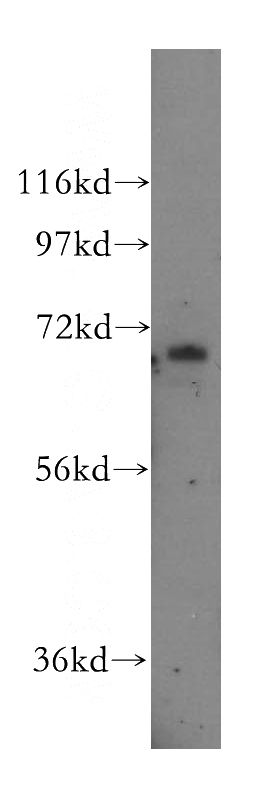-
Product Name
ZNF143 antibody
- Documents
-
Description
ZNF143 Rabbit Polyclonal antibody. Positive WB detected in HepG2 cells, mouse brain tissue. Observed molecular weight by Western-blot: 68 kDa
-
Tested applications
ELISA, WB
-
Species reactivity
Human,Mouse,Rat; other species not tested.
-
Alternative names
hStaf antibody; pHZ 1 antibody; SBF antibody; SPH binding factor antibody; STAF antibody; zinc finger protein 143 antibody; ZNF143 antibody
-
Isotype
Rabbit IgG
-
Preparation
This antibody was obtained by immunization of ZNF143 recombinant protein (Accession Number: BC020219). Purification method: Antigen affinity purified.
-
Clonality
Polyclonal
-
Formulation
PBS with 0.02% sodium azide and 50% glycerol pH 7.3.
-
Storage instructions
Store at -20℃. DO NOT ALIQUOT
-
Applications
Recommended Dilution:
WB: 1:500-1:5000
-
Validations

HepG2 cells were subjected to SDS PAGE followed by western blot with Catalog No:116949(ZNF143 antibody) at dilution of 1:800
-
Background
Zinc finger protein143(ZNF143) contains a separete acidic activation and 7 zinc finger domains. It's a transcription factor that required for activation of the majority of vertebrate snRNA and snRNA-type genes, which transcribed by RNA pol II and pol III. Also, it binds to the SPH motif of small nuclear RNA (snRNA) gene promoters and participates in efficient U6 RNA polymerase III transcription via its interaction with CHD8
-
References
- Parker JB, Yin H, Vinckevicius A, Chakravarti D. Host cell factor-1 recruitment to E2F-bound and cell-cycle-control genes is mediated by THAP11 and ZNF143. Cell reports. 9(3):967-82. 2014.
- Karczewski KJ, Tatonetti NP, Landt SG. Cooperative transcription factor associations discovered using regulatory variation. Proceedings of the National Academy of Sciences of the United States of America. 108(32):13353-8. 2011.
Related Products / Services
Please note: All products are "FOR RESEARCH USE ONLY AND ARE NOT INTENDED FOR DIAGNOSTIC OR THERAPEUTIC USE"
